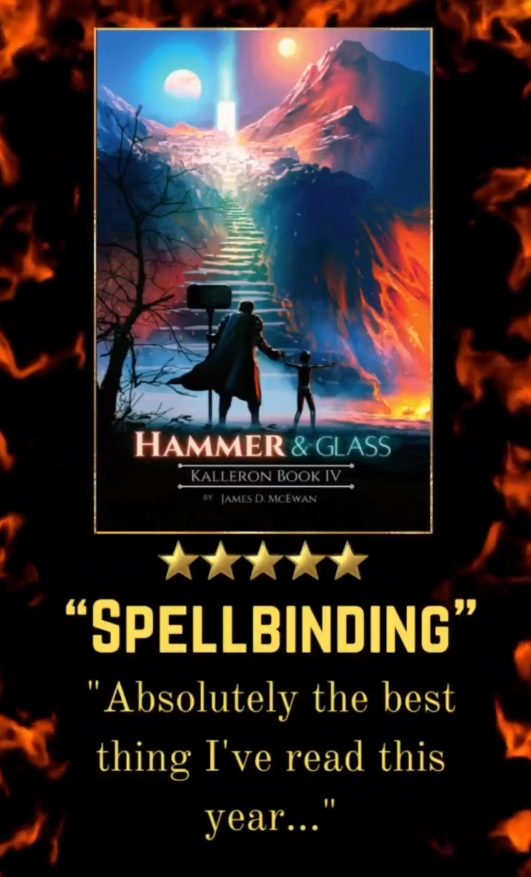A Boring Essay on Why Reviews Are Not Boring

"Spellbinding
Absolutely the best thing I’ve read this year and among the very best ever. A superbly crafted work of fiction which dares to rival the greatest adventures ever told."
These are the first few lines of a bona fide, independent review I received for Hammer & Glass, posted on Amazon in June 2023. It made my day, but not perhaps in the way you think.
Writing is an arduous process. Setting myself a weekly target over two-to-three months, I average 15,000 words per week. I get up at 5.30am, six or seven days a week to write. I’ve found that my most creative hours are in the morning. Often, I’ve written 1000 words before my wife wakes up just before 7am. Sometimes, I struggle to tap out anything on the keyboard. If I’ve not written a substantial amount by 9am, my day is a bust. And it’s a drag. I am self-employed with nobody looking over my shoulder. It sounds great, but I’m my boss. And I can be a total ass. At this present moment, I’m making virtually no money. In fact, if you factor in costs (such as this website), I make an enormous loss. Every month.
I’m under no illusion that it will take years to achieve commercial success. Even then, I might never make an income from writing. You might ask, then why do it? I hope you have asked that, because that is the crux of this blog post. I ask myself all the time, why do I do it? My previous job, in an industry I worked in for 27 years, was one I initially enjoyed. But eventually, it became so tiresome and mentally frustrating that I walked away from it, foregoing a good pension and a decent salary. My pension is now trashed. My income is gone. So why the hell did I do it? Why do something for nothing? Now, like a clever lawyer reeling the jury in, I ask you to revisit the first few lines. That review. It is such a small thing that means more than anything. In the absence of a financial incentive, it is the reviews I receive that make this worthwhile. I feed off of them. They are my Weetabix of well-being.
The reviews are nice, there’s no denying that. But they’re not ego-boosts. They’re validation. That’s one of the strongest motivators for an author, or for any artist or creative person. When you know something you have nurtured and built up has reached an audience that actually appreciates your efforts, it is a fulfilling moment. It’s a quality stamp on your hours, days, and months of labour. It’s a customer saying that they think what you’re doing is A-okay. That’s the sunny-side take on the review.
There is another flip side. The darker side. I wrote the novel M7RRORS, a literary fiction work which centres around a protagonist with mental illness. It’s not a coincidence the (few) reviews and the feedback I received said similar things. Surprise; I can write about elements of depression and anxiety because I’ve firsthand experience of them. Though I can say with 99% confidence, I don’t experience living delusions. As a depressive type, a lack of positive feedback is a sure-fire trigger of a downward spiral. If I had no reviews but made money from my work, I’d be content. Money is a transactional review. If my work generated a lot of money, I’d take it as a compliment. But without reviews, and with fresh soles on this long journey, it’s a pretty bleak morning, every morning. So, when a dear reader posts a review, it’s like Prozac in my coffee. It’s a damn good pizza with a nice cold beer. It’s the ending of Rogue One when they all get away. Spoiler, they didn’t.
Reviews do one more, less obvious, thing beyond telling others what you thought of something. I sell my books through Amazon. If an agent managed me, and a recognised publisher printed my books, I’d still like to have reviews. But as an independent author in full control of my work, reviews on Amazon are essential for me to reach people. The more reviews that appear beside my books, the more they appeal to others. It’s silly, really. Reviews are subjective. But the volume of reviews gives the impression of popularity. It gives a sense of reliability, which is strange because books aren’t mechanical things that break or have faults. Unless you consider poor grammar to be the literary equivalent of an exploding vape. In the sense of affecting sales power, a product with more reviews will garner more sales than a similar product with few reviews. There are also powerful algorithms at play, and a book with more reviews gets pushed higher up the ranks. Books with few reviews from new authors slum it in the dumps. Even when they’re damn good.
The takeaway from this is not just to leave a review for my books. There are countless other people working hard to make an impression. If you ever purchase something from a small independent, you should really leave a review if you think they deserve the exposure. You might think nobody wants to listen to what you think of what you bought, but trust me, we do.
And if you didn’t like my book? It’s okay, you might like the other ones.
.png)